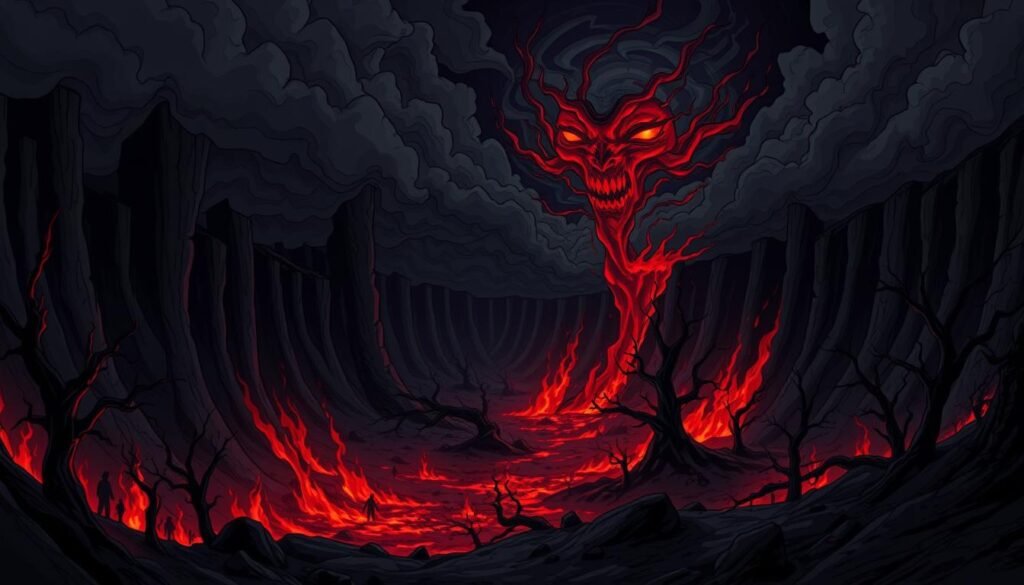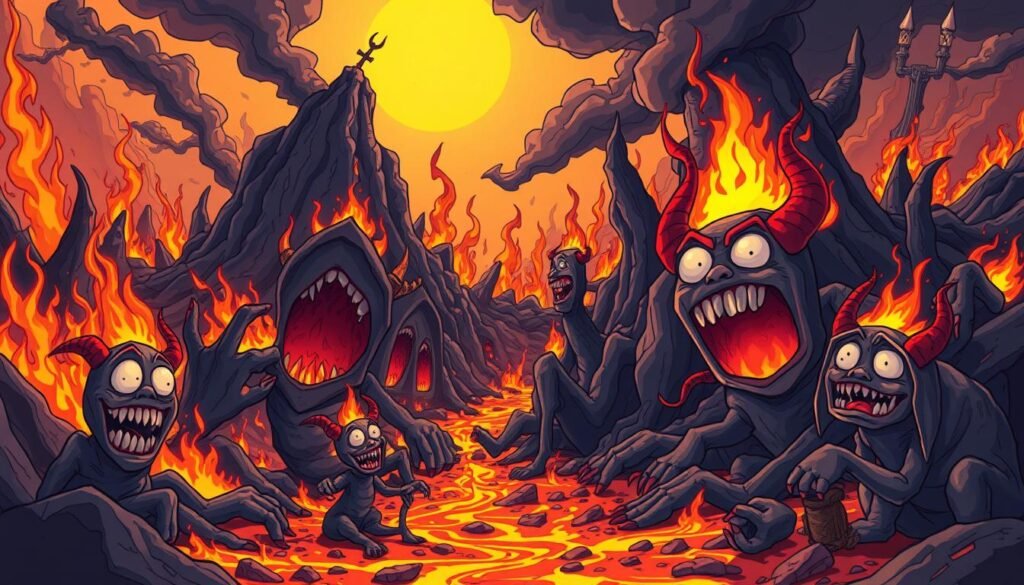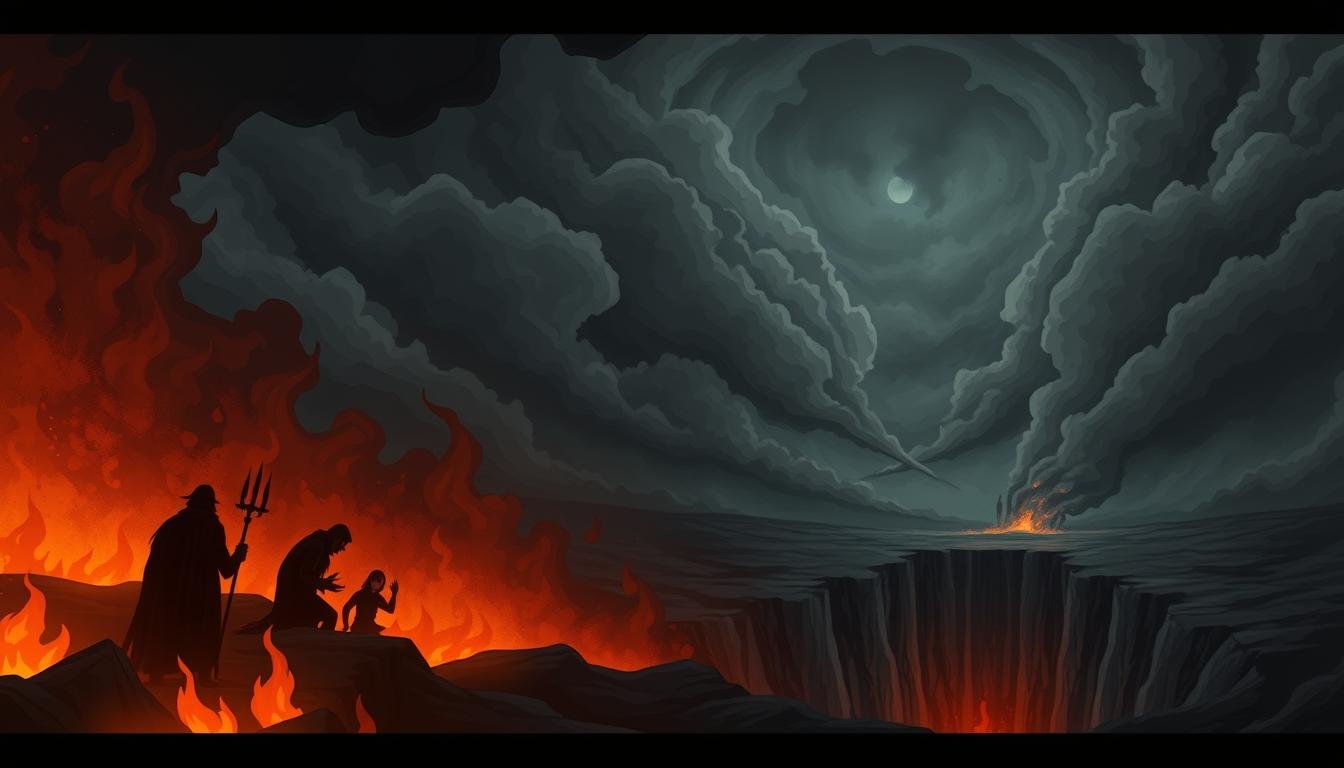In our world, we often shy away from hard truths. The idea of hell is one of the most serious parts of Christian teachings. It makes us think about what happens after we die.
Many people might not want to look at the scary parts of the Bible. But ignoring these parts can make us too comfortable. Jesus talked more about hell than heaven. He showed how serious it is for those who don’t choose the right path.
Many Christians don’t know what the Bible says about hell. This creates a big misunderstanding about eternal punishment. As we look at hell in the Bible, we see scary descriptions of pain and regret.
It shows a place for cowards, faithless, and immoral people. But it also shows a place for the righteous to live forever. We must see hell as a real warning, not just a myth. It reminds us of the choices we make under God’s judgment.
What is Hell According to the Bible?
The Bible talks a lot about hell. It says hell is a real place, like heaven and earth. It’s where souls go if they don’t accept Christ. They suffer forever, cut off from God.
Scriptures like 2 Thessalonians 1:9 and Luke 16:23 show this. They talk about the pain of being away from God’s goodness. This shows how bad it is to be separated from God forever.
Jesus talked about hell more than heaven. He said it’s dark, full of tears, and fire. He compared it to the Valley of Hinnom, a place of pain and destruction. This makes us understand hell as a place of punishment and sadness.
The Bible is clear: hell is forever. Those in hell suffer without end. Some think the wicked might just disappear, but the Bible doesn’t really say that. It warns us to be good and seek God’s grace. For more on this, check out the meaning of curse words in the Bible.
Understanding the Concept of Eternal Punishment
The idea of eternal punishment is big in Christian beliefs. It shows that sin has big and lasting effects. The consequences of sin against a holy God mean eternal punishment. Matthew 25:46 says both good and bad people get eternal fates.
This shows the idea of eternal pain for the bad. Revelation 14:9-11 talks about eternal pain for those who choose evil. It shows that sin against God means endless punishment.
Jesus talked a lot about hell. He showed what hell is and why we should change. His words warn us but also invite us to be good.
The Most Disturbing Verses About Hell
The Bible has many scary verses about hell. They remind us of the dangers of sin. For example, Matthew 10:28 says, “Do not fear those who kill the body but cannot kill the soul. Rather fear Him who can destroy both soul and body in hell.” This verse shows God’s power over our eternal fate.
In Revelation 20:12-15, people are judged for their actions. They either get eternal life or go to the lake of fire. This shows God’s justice is serious. Alistair Begg says we should talk about hell with kindness and truth.
Matthew 13:47–50 talks about angels separating the good from the bad. The bad go to a fiery place where they cry and gnash their teeth. This verse is a scary reminder of being away from God.
Thinking about these scary verses, we see God’s warnings. God loves us but warns us about hell. This teaches us about sin and justice, urging us to think deeply about our faith.
Verses About Hell in the Bible: A Scriptural Overview
Hell in the Bible is a big topic for deep talks. It shows us about forever punishment and who is right and wrong. Different translations show the deep meanings in verses about hell.
Key Biblical References on Hell
Many verses talk about hell and its harshness. Six out of twenty-three verses talk about forever punishment. Revelation 21:8 says the unrepentant will end up in a “lake of fire.”
Matthew 25:41 talks about eternal fire for the devil and his angels. This shows the bad fate for those not in the book of life, as Revelation 20:15 says.
Interpreting Hell Through Different Bible Translations
Various Bible translations help us understand hell better. The ESV, NKJV, and NIV show different views on hell. For example, Matthew 13:41-42 talks about separating the good from the bad, like a “fiery furnace.”
Luke 16:23-24 shows the pain of hell clearly. Matthew 10:28 warns us to fear God, showing how serious hell is.

Why Did God Create Hell?
Many people wonder why God made hell. This question is important to both experts and everyday folks. The purpose of hell is a big part of this discussion.
Bible stories tell us hell is for punishment. It’s because of sin and God’s justice. As Matthew 25:41 says:
“Then he will say to those on his left, ‘Depart from me, you cursed, into the eternal fire prepared for the devil and his angels.’”
Hell was made for Satan and his angels. This shows hell is not just random punishment. It’s a response to sin.
Hell is more than just punishment. It shows how serious it is to turn away from God. Revelation 21:8 lists who goes to hell, like cowards and those who don’t believe.
C.S. Lewis says people in hell chose to be there. They made choices that led them away from God’s grace. So, God’s creation of hell is not unfair. It shows His commitment to right and wrong.
The idea of hell also fits with divine justice. Romans 6:23 says sin leads to death. This idea is found in many parts of the Bible.
Not choosing Jesus means being separated from God forever. This is a sad truth. While hell is for the devil, our choices can also lead us there. This shows a deep irony.
The Nature of Suffering in Hell
The Bible talks about hell as a place full of suffering. This suffering is not just physical but also spiritual and emotional. It shows how serious sin is.
Romans 6:23 says sin leads to death. This means those who don’t ask for forgiveness will face this fate.
Those who don’t forgive face a life without peace. Mark 9:48 talks about hell as a place with no end to suffering. It’s a harsh reminder of what happens if you don’t accept God’s grace.
The idea of fair hell is a big question in theology. Romans 3:10-11 says no one is perfect, so we all need forgiveness. This makes us wonder about God’s justice and mercy.
Christians struggle with the idea of Heaven and hell. Revelation 21:4 promises no more pain or sadness in Heaven. But the thought of loved ones in hell is very worrying.
The Bible says believing in Christ can save us. Romans 8:1 says there’s no blame for those who believe. It’s a call to take sin and forgiveness seriously, for a life of joy.
Jesus’ Teachings on Hell and Its Torments
Jesus talked a lot about hell in the Gospels. He showed us what happens when we sin and don’t love God. He used words like “outer darkness” and “weeping and gnashing of teeth” to describe the pain in hell.
The word “gehenna” comes from a place near Jerusalem. It was where trash was thrown away. Jesus said hell is like this, a place of constant burning. He warned us about it, especially for those who don’t listen to Him.
In Matthew 25:41, Jesus says hell was made for the Devil and his angels. This means hell is not for people. Scholars say hell is for those who don’t accept God’s mercy.
Jesus was very serious when talking about hell. He talked about it more than Heaven. He wanted us to think about the bad choices we make. The Bible talks a lot about God’s mercy and judgment.
Common Misconceptions About Hell
Many people have wrong ideas about hell. These ideas come from stories and what others think. The Bible says hell is forever for those who don’t accept Jesus. This shows a big biblical error in how we see hell.
Some think hell is a place where you can change your mind and ask for forgiveness. But the Bible says, “It is appointed for man to die once, and after that comes judgment” (Hebrews 9:27). This means no second chances after death. Many misconceptions about hell make judgment seem less important.
People often think hell is a party with Satan in charge. But the Bible says Satan and his demons will be punished in hell. This is opposite of what myths say. They will face punishment for rebelling against God.

Some think those in hell will ask for mercy. But the Bible says they won’t. They will stay defiant. Also, many think people are in hell unfairly. But the Bible says everyone in hell deserves it.
There are also myths about heaven. Some think people want to go to heaven but can’t. But Jesus says everyone who comes to Him will be accepted. Another myth is that everyone will be saved. But the Bible doesn’t support this. So, it’s important to understand these misconceptions about hell to know the truth.
Looking into how society views ghosts and the Bible can help. Especially during times like Halloween. For more, check out this link.
Why People Reject the Idea of Hell
Many people today don’t believe in hell. They find it hard to think of a loving God punishing souls forever. This makes them question or change what they’ve always thought about hell.
Views on hell vary across cultures. This affects how people see it. The Bible talks about hell in different ways, like “gehenna,” “tartaurus,” and “hades.” These words add to the mystery of what comes after we die.
Important thinkers like George MacDonald and C.S. Lewis have also changed how we think about hell. MacDonald believed hell was a place to purify, not just a place of suffering. Their ideas make us think about our beliefs in a new way.
Interestingly, 75 percent of Americans say hell exists, but only 4 percent think they’ll go there. This shows a big gap in what people believe. Many don’t want to face the idea of sin or think about what happens because of it. They prefer to believe in choices over punishment from God.
Biblical Images and Descriptions of Hell
The Bible uses biblical imagery of hell to show its scary side. Many passages give vivid descriptions of hell that make readers feel scared. Jesus talked about “hell” a lot, showing it’s key in Christian stories.
This part looks at how words paint a picture of sin’s bad end.
Metaphorical Language Used in Scripture
Scripture uses metaphors like “lake of fire,” “outer darkness,” and “blazing furnace” to describe hell. These pictures show not just physical pain but also deep sadness of being away from God. For example, “weeping and gnashing of teeth” means deep sadness for those who are lost.
These metaphorical language words show how bad forever punishment is. They match with 2 Thessalonians 1:7-9, which talks about “everlasting destruction” for those who disobey God.
Also, many descriptions show hell as a turning point for the wicked. Revelation 20:12-14 talks about a future judgment. The dead are judged by their actions and thrown into the lake of fire.
This shows hell is real and very scary. For more on this, check out more about hell in the Bible.
Quotes About Hell from Christian Leaders
Christian quotes about hell show different views on a complex topic. Leaders like C.S. Lewis and A.W. Tozer share deep thoughts. Lewis said hell is a state of being, not just a place. He stressed that our choices lead us there.
A.W. Pink saw hell as a warning for those who ignore God’s grace. Many theologians, like Jonathan Edwards, talked about God’s wrath. Edwards used strong words to show hell’s suffering.
Russell Moore and Tim Keller talk about love and justice in hell. They say knowing about hell shows God’s deep love for us. They believe it helps us understand our faith better.
When thinking about hell, people look to the Bible for answers. Matthew 25:41 and Revelation 20:15 talk about judgment and sin’s consequences. These teachings, along with leaders’ words, make us think and act on our faith.
How to Respond to the Teachings About Hell
Teachings about hell remind us of God’s justice and the dangers of ignoring His words. Christians should act quickly to fight against hell. The idea of annihilationism, or eternal nothingness, challenges the old view of hell. We must think deeply and humbly, based on the Bible.
Bible verses like Matthew 25:46 and Revelation 20:10 show that punishment for rejecting God is forever. Christians should often think about these teachings. This helps us want to share the Gospel with others.
Dealing with hell means more than just knowing about it. We must spread the word, pray deeply, and follow Jesus closely. Each of us must work for God’s Kingdom and live by the Bible’s teachings. The message of hell should make us think about our own future and urge us to tell others about salvation.
FAQ
What is the biblical definition of hell?
In the Bible, hell is a place for those who don’t accept Christ. It’s where they face God’s fierce wrath forever. It’s a total, conscious, and eternal separation from God, leading to endless suffering without joy or hope. This is shown in verses like 2 Thessalonians 1:9 and Luke 23:43.
How does the concept of eternal punishment fit within Christian eschatology?
Eternal punishment is key in Christian beliefs about the end times. It’s based on the idea that sins against a holy God deserve eternal punishment. Matthew 25:46 says both the good and the bad will face eternal fates. It sees hell as a warning for those who don’t change and a chance for redemption.
What are some of the most alarming scripture verses about hell?
Some scary verses about hell include Revelation 21:8 and Matthew 10:28. They show vivid pictures of punishment. They stress how serious hell is and urge us to think about its eternal consequences.
How do different Bible translations describe hell?
Different translations describe hell in similar but different ways. For example, “lake of fire” in Revelation 21:8 is a common term. By looking at translations like ESV, NKJV, and NIV, we get a better understanding of hell’s nature and its importance in the Bible.
Why was hell created according to the Bible?
The Bible says hell was made for punishment, mainly for Satan and his angels, as Matthew 25:41 mentions. Human sin led to more souls being punished there, sharing the devil’s fate.
What kind of suffering is described in hell?
Hell is filled with deep suffering, as the Bible describes it. Verses like “weeping and gnashing of teeth” (Matthew 13:49-50) and “the worm that does not die” (Mark 9:48) show the pain of those who reject God. It’s a mix of physical, spiritual, and emotional pain.
What insights did Jesus provide about hell?
Jesus talked a lot about hell, showing it’s real and those who reject God’s love face eternal punishment. His teachings, like the story of the rich man and Lazarus (Luke 16:19-31), highlight the seriousness of hell’s fate.
What are common misconceptions people have about hell?
Many think hell is just a metaphor or temporary. But the Bible clearly says it’s real and forever. This goes against what some think, despite what others believe.
Why do some individuals reject the existence of hell?
Some can’t accept hell because they think a loving God wouldn’t punish forever. This makes them question or ignore what the Bible says about hell. Cultural and personal views also play a part in changing beliefs about hell.
How is hell portrayed through metaphors in scripture?
The Bible uses metaphors like “lake of fire,” “outer darkness,” and “blazing furnace” to describe hell. These images aim to shock and show that hell is a real place of horror, not just a symbol.
What reflections do prominent Christian figures offer regarding hell?
Christian leaders like C.S. Lewis, Billy Graham, and John MacArthur have serious views on hell. Their thoughts help us understand hell’s role in faith and our actions better.
How should Christians respond to teachings about hell?
Christians should take the teachings about hell seriously and act on them. This means living a faith that’s active, spreading the gospel, and thinking about their relationship with Jesus to avoid such a fate.

Rockin’ the faith, one verse at a time!
Growing up, the Bible’s stories deeply impacted me. Now, with over 15 years of preaching experience, I blend timeless teachings with modern technology, making them relevant for today’s world.
Bible Hub Verse is my platform to share historical insights and thought-provoking articles, exploring both familiar and uncommon Christian topics. My passion is building a welcoming online space for everyone to learn, grow in their faith, and discover the Bible’s enduring message.
Join the journey!
God bless you.









